Featured
The North American and European cocoa grinds were at least 4% lower than a year ago
New York and London closed sharply lower again last week. Importers are still looking for ways to source Cocoa without paying a premium demanded by Ivory Coast and Ghana. Both countries have instituted a living wage for producers there and are looking to tax exports to pay the increased wages. Buyers have been accused of using certified stocks from the exchange instead of buying from origin.
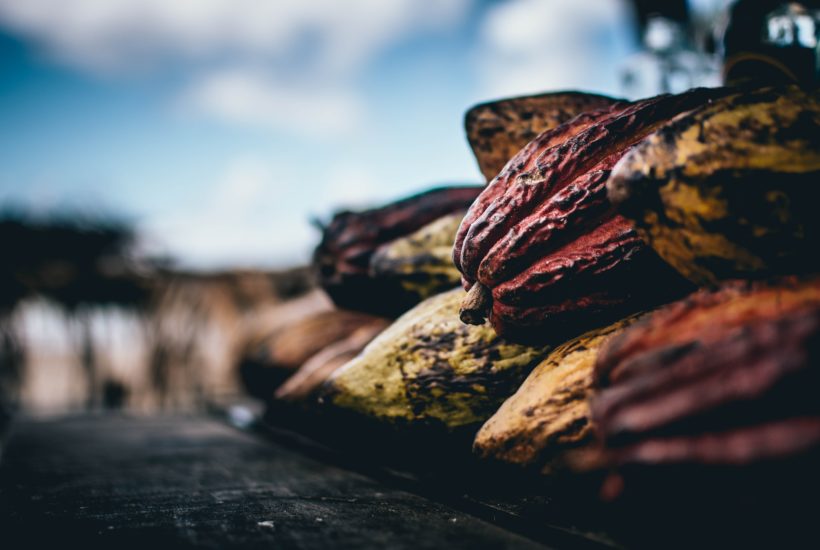
Wheat
Winter Wheat markets were higher in reaction to news that the Russian government is looking to tame food inflation inside the country by taxing and issuing new export quotas on Wheat along with some other agricultural products. US prices moved very close to international prices and US markets searched for new demand. Export demand has started to improve with the close price relationships although they are still not huge. World prices have held steady or worked a little higher even with additional supplies available to the market as Russian prices remain elevated. Australian supplies have increased as its harvest is moving forward. US weather is mixed with still dry conditions in the western Great Plains. Some precipitation was reported in the eastern Great Plains and in parts of the Midwest. Parts of eastern Ukraine and southern Russia remain dry. USDA increased export demand and cut ending stocks in its supply and demand reports released Thursday.
Weekly Chicago Soft Red Winter Wheat Futures
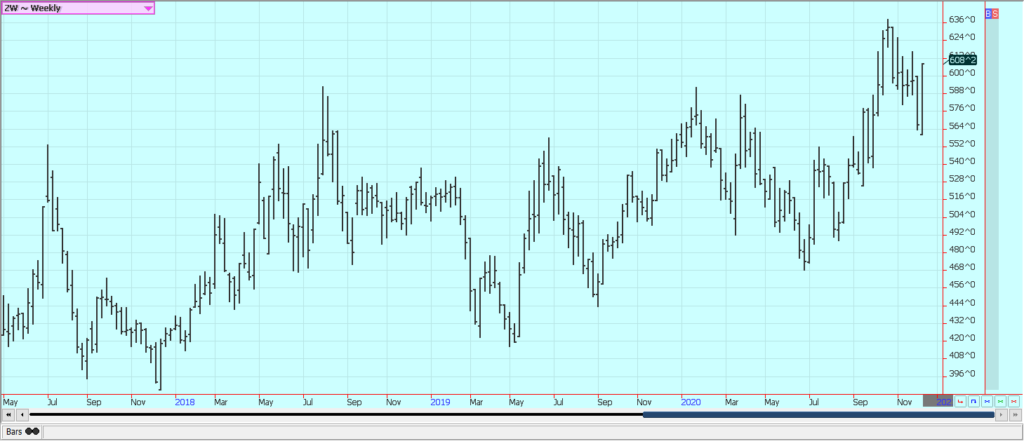
Weekly Chicago Hard Red Winter Wheat Futures
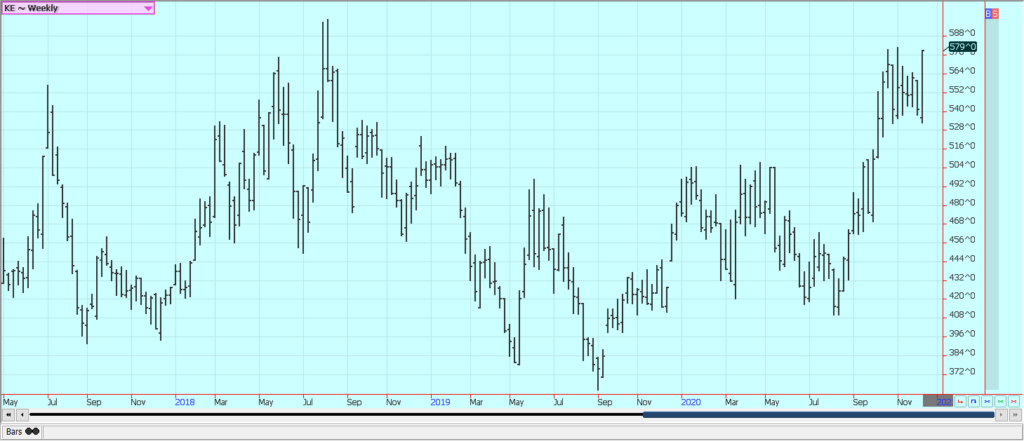
Weekly Minneapolis Hard Red Spring Wheat Futures
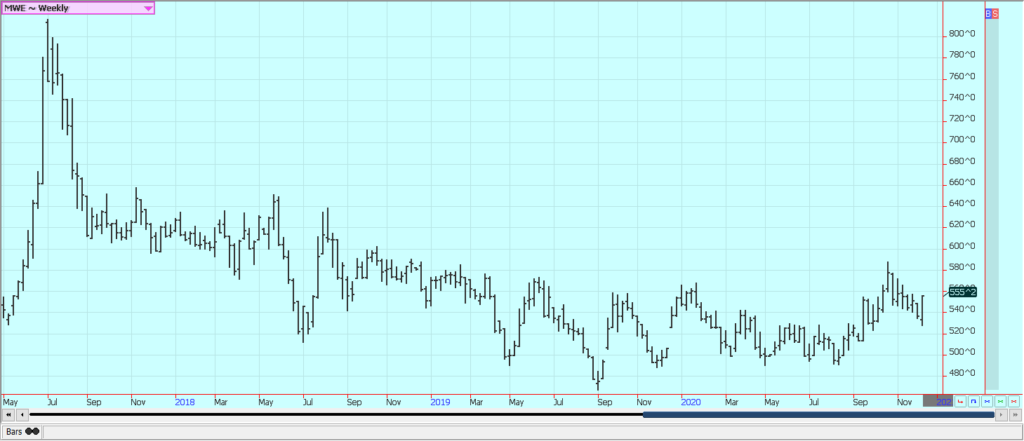
Corn
Corn was a little higher last week but held inside the previous weeks trading range. Oats moved sharply higher again last week. Little export demand was noted from China by USDA in the weekly export sales report. It has rained in parts of Argentina and in much of Brazil in the past week. Drought could develop in Brazil and Argentina despite the rains this week as the overall weather patterns have been dry. The drought is especially serious in South America for the first Corn crop but the second crop could also be affected due to late planting in central and northern Brazil. Dry weather has delayed the Soybeans planting and that will delay the second Corn planting later. Farmers will not plant if it gets too late in the year as the rains will shut off before the crop gets mature. USDA made no changes to its supply and demand estimates released Thursday. The trade had expected more demand and less ending stocks.
Weekly Corn Futures
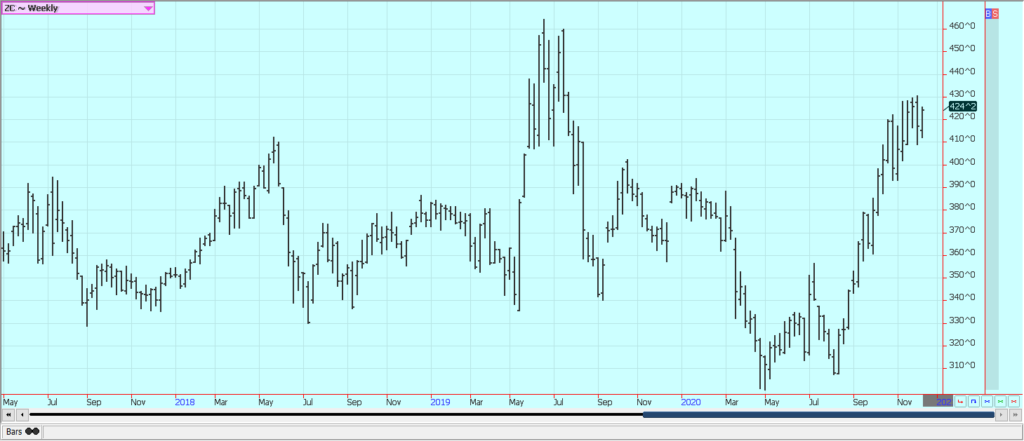
Weekly Oats Futures
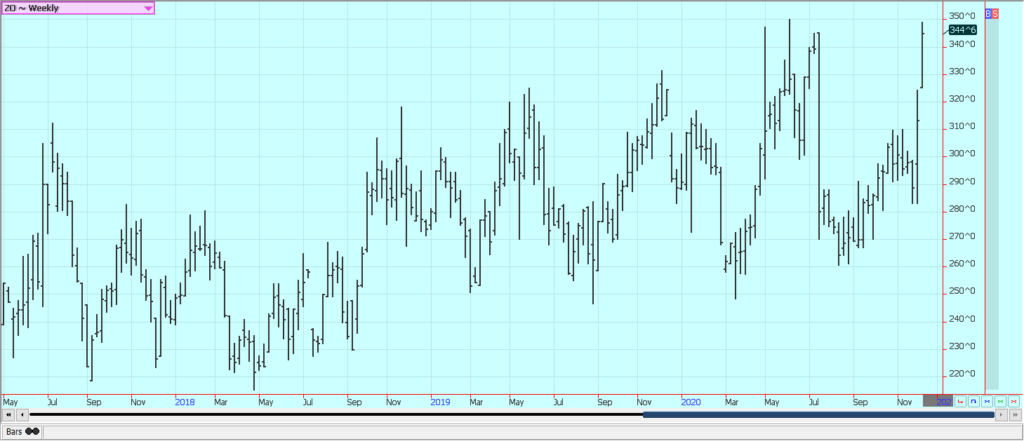
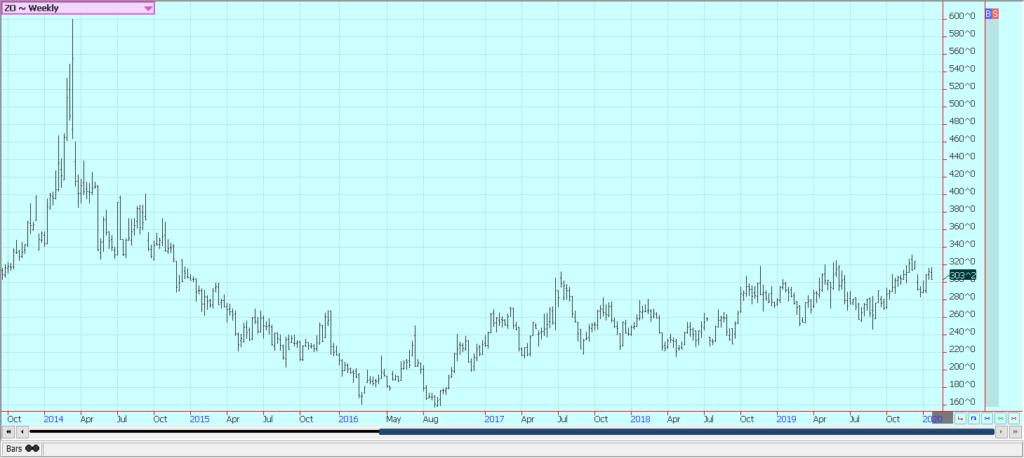
Soybeans and Soybean Meal
Soybeans and Soybean Meal closed a little lower on better rains in South America and the lack of Chinese demand for US Soybeans. China continues to buy in small amounts each day but has cancelled some contracts made to unknown destinations again in the past week. Production potential is being threatened in South America due to the lack of rainfall. The situation is most serious in central and northern Brazil, but has improved in southern Brazil and Argentina due to recent rains. These rains are leaving southern Brazil and Argentina now and will move to the north. Southern Brazil and Argentina will now turn warm and dry and this will be much more consistent with atypical La Nina pattern. The world will need very strong production from South America to meet the projected demand. The stocks to use ration for Soybeans is now very small and the situation is the tightest projected in years. Higher Soybeans prices are likely. USDA increased domestic demand for Soybeans in its monthly supply and demand updates but made no changes to export demand. Ending stocks were less, but the cut was less than the trade had expected and Soybeans started to move lower on Thursday.
Weekly Chicago Soybeans Futures:
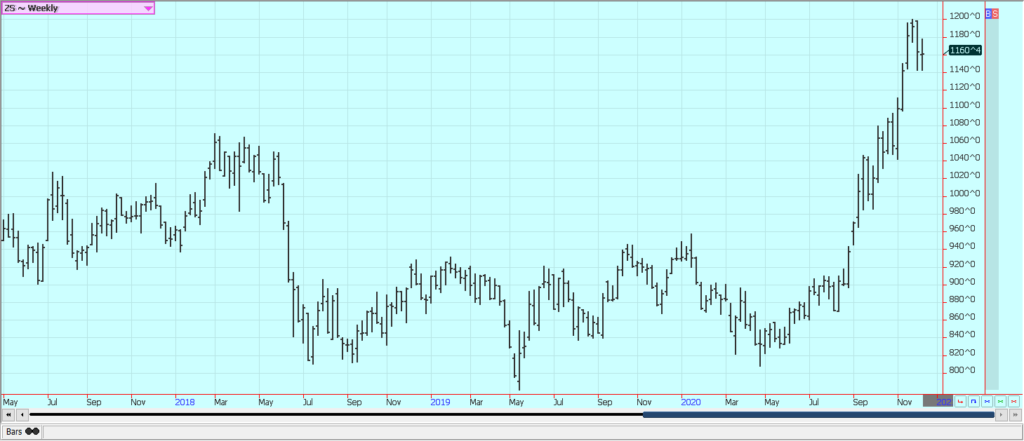
Weekly Chicago Soybean Meal Futures
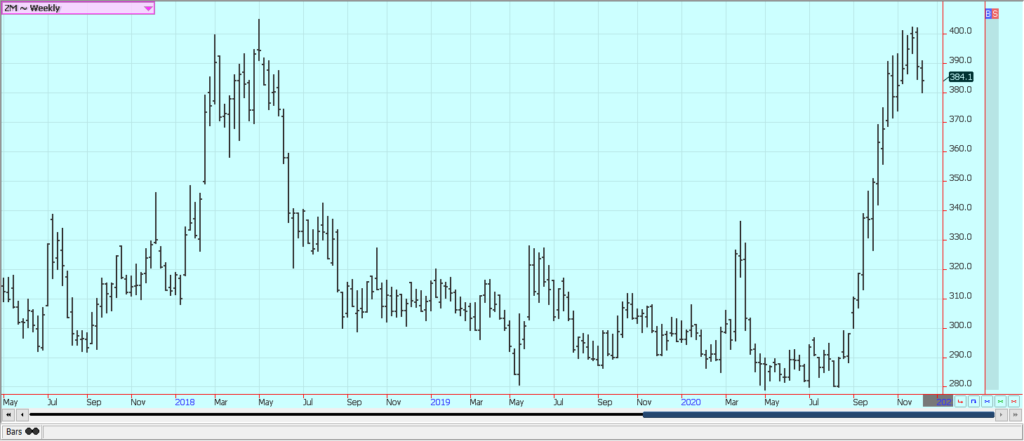
Rice
Rice was higher last week as trading reflected the lack of activity in the domestic cash market. Trading volumes have been less for the last couple of weeks. The cash market is slow and the lack of business is reflected in futures volumes traded. Reports indicate that domestic demand has been poor to average with better consumer demand more than offset by much less demand from schools and other institutions. USDA cut long grain export demand and increased ending stocks estimates in its supply and demand reports released on Thursday. The reports should have been bearish to prices but futures were able to rally anyway.
Weekly Chicago Rice Futures
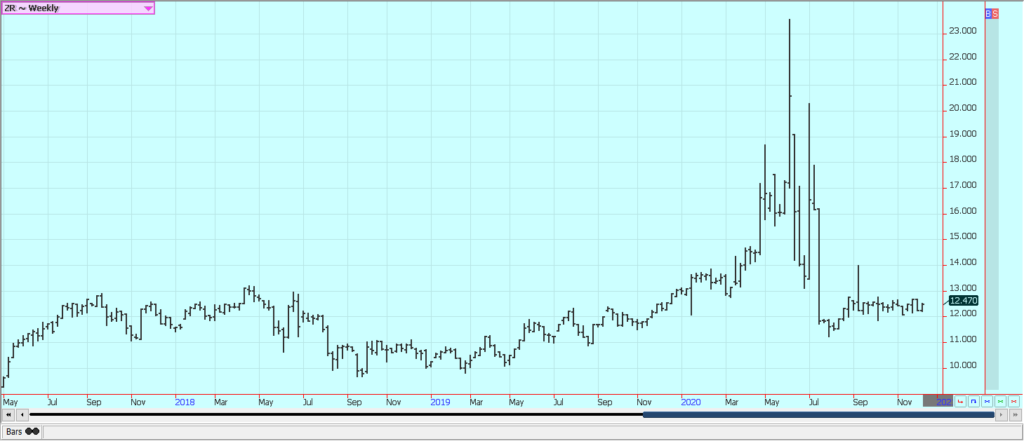
Palm Oil and Vegetable Oils
Palm Oil closed higher and made a new high weekly close. The market was supported late in the week by ideas of tight supplies coming down the road. MPOB released its monthly supply and demand report and noted less production. Production of most vegetable oils in the world is less this year due to a lack of production of oilseeds. The production of Palm Oil is down in both Malaysia and Indonesia. Palm Oil prices are relatively high right now so importers are looking at importing Soybean Oil instead due to cost and quality. Soybean Oil and Canola were higher on strong demand ideas. Soybean Oil was a follower. Very strong Palm Oil prices have made buying Soybean and Canola oils the better option. Trends are up in Soybean Oil and in Canola. Demand for Canola has improved in recent weeks and farm selling has been less as farmers have reduced supplies.
Weekly Malaysian Palm Oil Futures:
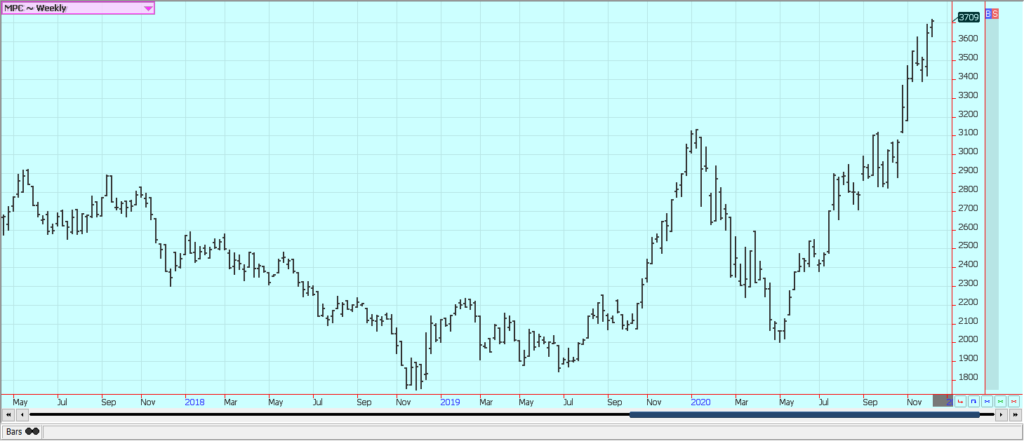
Weekly Chicago Soybean Oil Futures
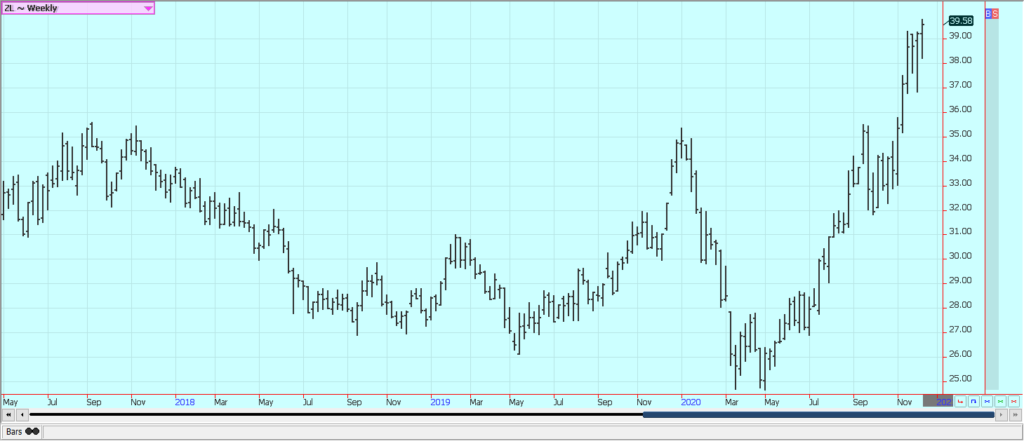
Weekly Canola Futures:
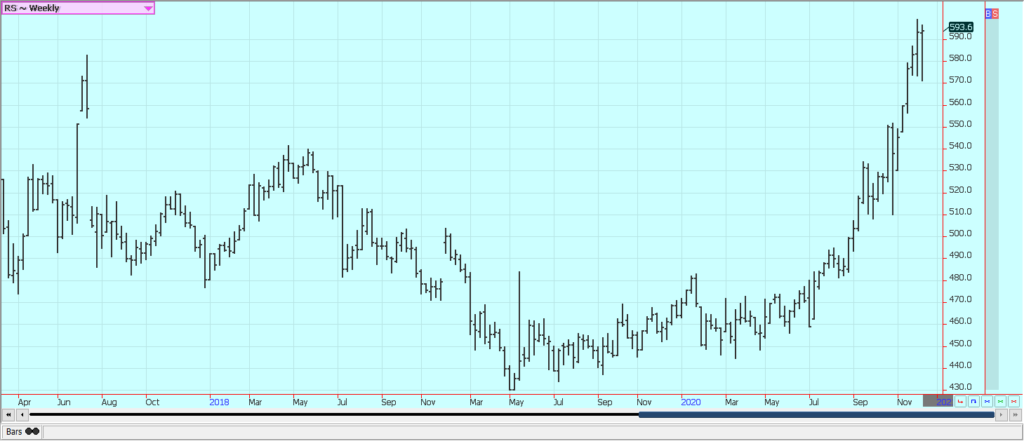
Cotton
Cotton closed sharply higher and made a new high close on the weekly charts. USDA surprised the market on Thursday when it released its monthly supply and demand reports. The reports showed a significant drop in production of US Cotton and much reduced US ending stocks levels. The reports were bullish and a move to the upper end of the 70 cents range is possible. Harvest is wrapping up amid drier weather conditions in West Texas and the Delta and Southeast. The weekly export sales report showed very strong demand last week. Export demand has held strong despite stay at home orders and weaker economies around the world. Traders now hope for even more demand later as the vaccines are given out and the world economies start to recover.
Weekly US Cotton Futures
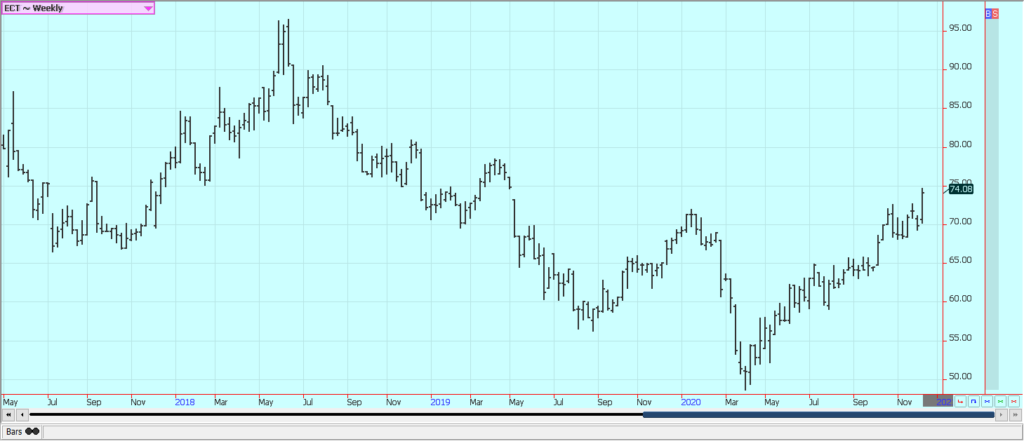
Frozen Concentrated Orange Juice and Citrus
FCOJ was lower last week, partly in response to the USDA production report that showed better production of oranges in Florida than had been expected. The weather in Florida remains mostly benign. Florida has been spared any hurricanes or other serious storms this year in a year that has been very active for tropical storms. The Coronavirus is still promoting consumption of FCOJ at home. Restaurant and food service demand has been much less as no one is dining out. The weather in Florida is good with frequent showers to promote good tree health and fruit formation. Brazil has been too dry and irrigation is being used. Showers are falling in Brazil now and these need to continue to ensure good tree health. However, it could turn warm and dry again next week. Mexican crop conditions are called good with rains.
Weekly FCOJ Futures
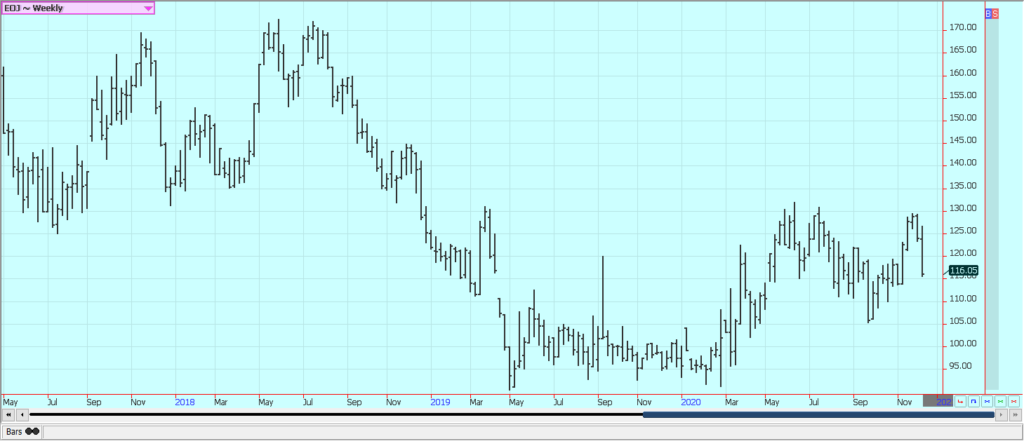
Coffee
Futures were a little higher last week in New York but closed near unchanged in London. It has been a weather market and the weather has improved. Vietnam has harvested about a quarter of its projected production under mostly dry conditions. Central America is also drier for harvesting. Brazil is getting some rains now to improve flowering after an extended dry season. The demand from coffee shops and other food service operations is still at very low levels as consumers are still drinking Coffee at home. Reports indicate that consumers at home are consuming blends with more Robusta and less Arabica. The weather is good in Colombia and Peru.
Weekly New York Arabica Coffee Futures
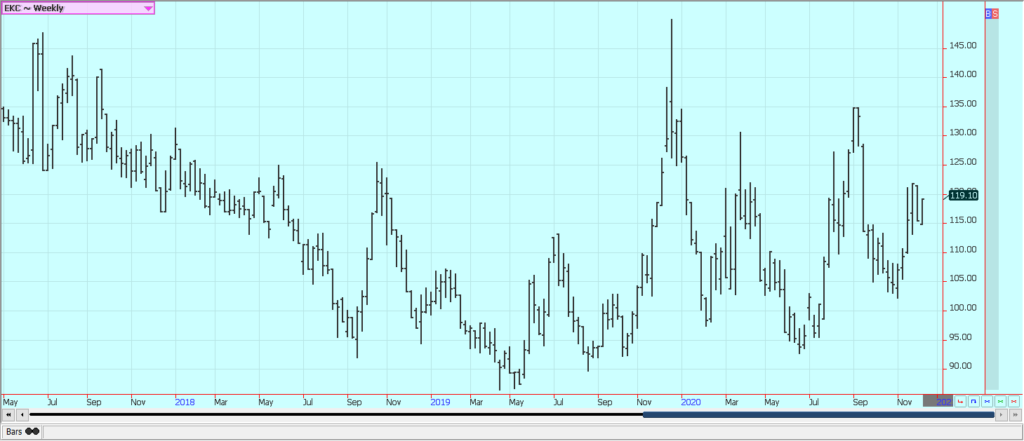
Weekly London Robusta Coffee Futures
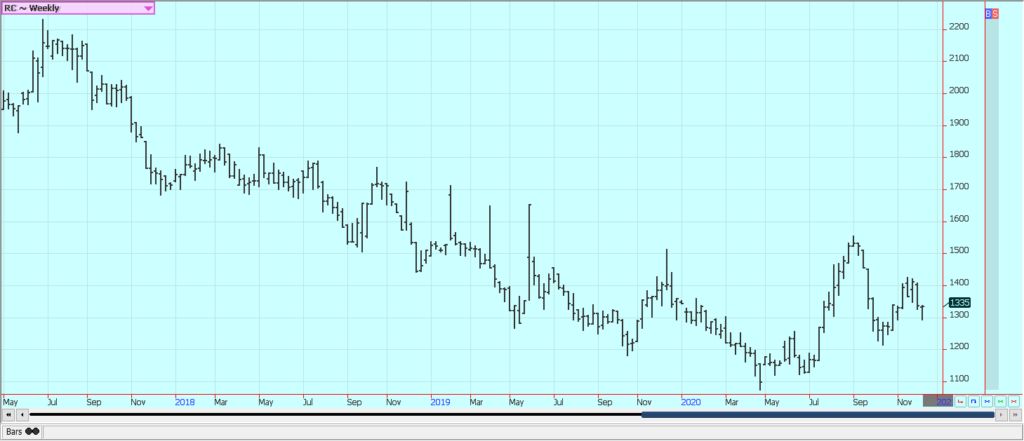
Sugar
New York and London closed unchanged to a little lower last week. It has been raining in south central Brazil and the production of cane has been affected. The first half of November crush was down almost 20% from the previous year as cane production has been hurt due to dry weather earlier in the year. Brazil mills have been producing more Sugar and less Ethanol due to weak world and domestic petroleum prices. India has a very big crop of Sugarcane this year. The Indian government has not announced the subsidy for exporters of Sugar so no exports are coming out of India yet. Sources told wire services that any subsidy will need to be significant to get export sales on the books. Thailand might have less this year due to reduced planted area and erratic rains during the monsoon season. The EU is having problems with its Sugarbeets crop due to weather and disease. Coronavirus has returned to the world and has caused some demand concerns, especially for Ethanol.
Weekly New York World Raw Sugar Futures
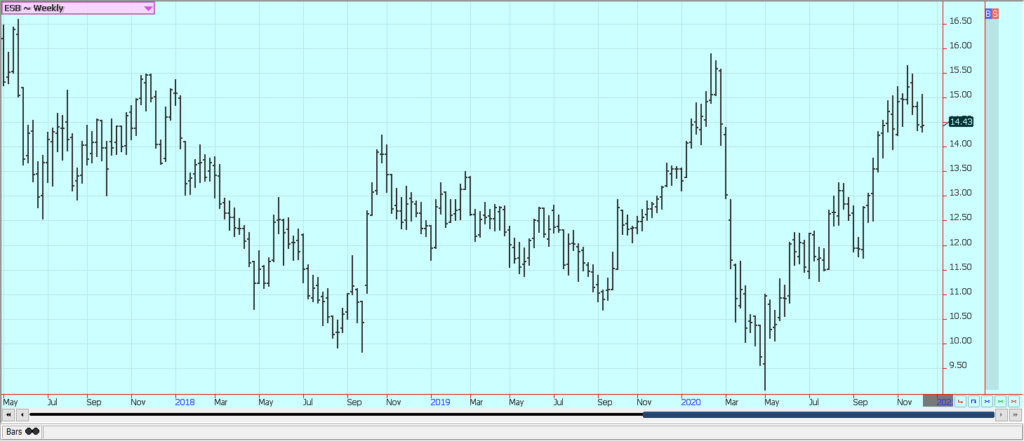
Weekly London White Sugar Futures
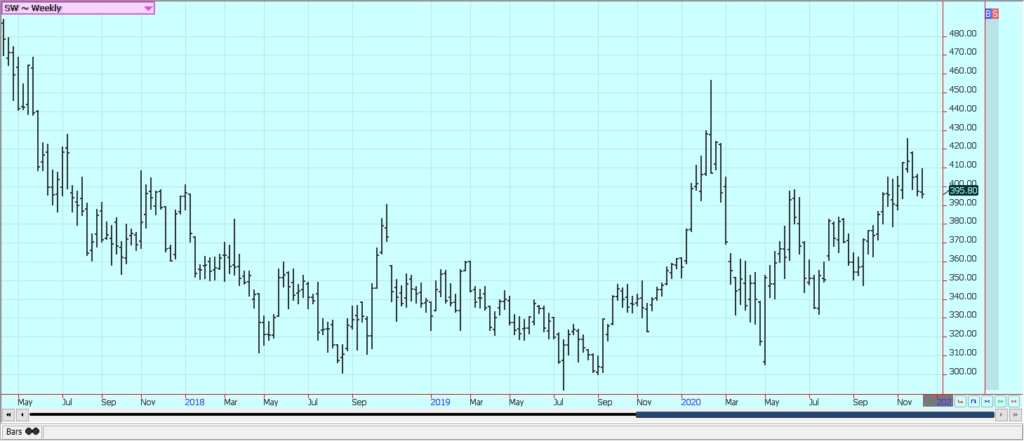
Cocoa
New York and London closed sharply lower again last week. Importers are still looking for ways to source Cocoa without paying a premium demanded by Ivory Coast and Ghana. Both countries have instituted a living wage for producers there and are looking to tax exports to pay the increased wages. Buyers have been accused of using certified stocks from the exchange instead of buying from origin. However, it looks like the exchange buying has come to a halt for now. There are a lot of demand worries as the Coronavirus is making a comeback in the US. Europe is also seeing a return of the pandemic. The North American and European cocoa grinds were at least 4% lower than a year ago and the Asian cocoa grind was down 10% from last year.
Weekly New York Cocoa Futures
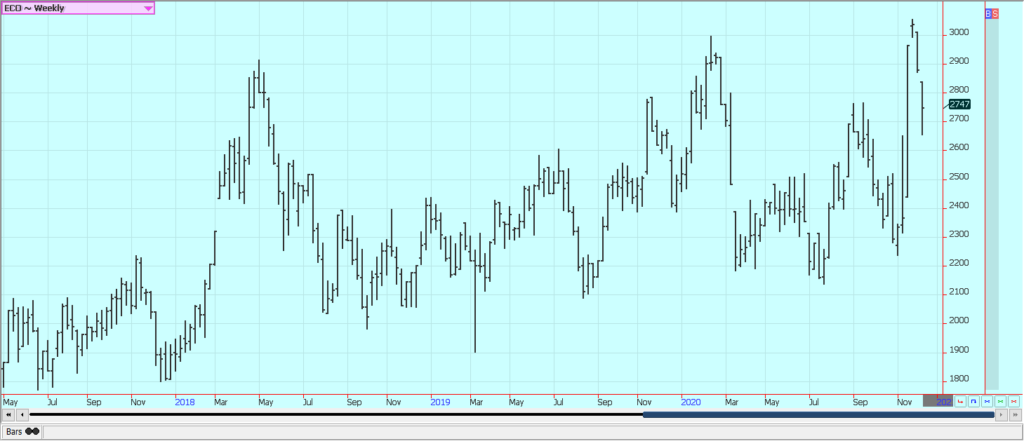
Weekly London Cocoa Futures
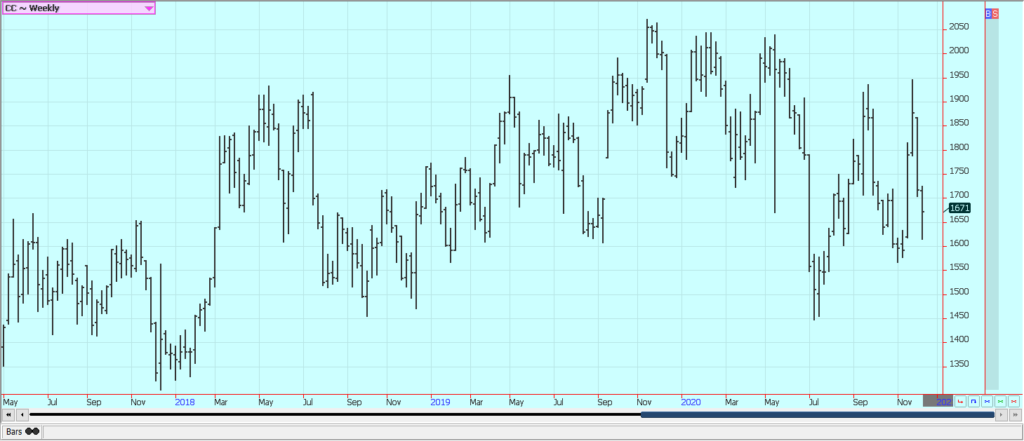
__
(Featured image by Alexandre Brondino via Unsplash)
DISCLAIMER: This article was written by a third party contributor and does not reflect the opinion of Born2Invest, its management, staff or its associates. Please review our disclaimer for more information.
This article may include forward-looking statements. These forward-looking statements generally are identified by the words “believe,” “project,” “estimate,” “become,” “plan,” “will,” and similar expressions. These forward-looking statements involve known and unknown risks as well as uncertainties, including those discussed in the following cautionary statements and elsewhere in this article and on this site. Although the Company may believe that its expectations are based on reasonable assumptions, the actual results that the Company may achieve may differ materially from any forward-looking statements, which reflect the opinions of the management of the Company only as of the date hereof. Additionally, please make sure to read these important disclosures.
Futures and options trading involves substantial risk of loss and may not be suitable for everyone. The valuation of futures and options may fluctuate and as a result, clients may lose more than their original investment. In no event should the content of this website be construed as an express or implied promise, guarantee, or implication by or from The PRICE Futures Group, Inc. that you will profit or that losses can or will be limited whatsoever. Past performance is not indicative of future results. Information provided on this report is intended solely for informative purpose and is obtained from sources believed to be reliable. No guarantee of any kind is implied or possible where projections of future conditions are attempted. The leverage created by trading on margin can work against you as well as for you, and losses can exceed your entire investment. Before opening an account and trading, you should seek advice from your advisors as appropriate to ensure that you understand the risks and can withstand the losses.

-

 Markets3 days ago
Markets3 days agoThe Big Beautiful Bill: Market Highs Mask Debt and Divergence
-

 Crowdfunding2 weeks ago
Crowdfunding2 weeks agoTasty Life Raises €700,000 to Expand Pedol Brand and Launch Food-Tech Innovation
-

 Markets1 day ago
Markets1 day agoA Chaotic, But Good Stock Market Halfway Through 2025
-

 Cannabis1 week ago
Cannabis1 week agoCannabis Clubs Approved in Hesse as Youth Interest in Cannabis Declines
























